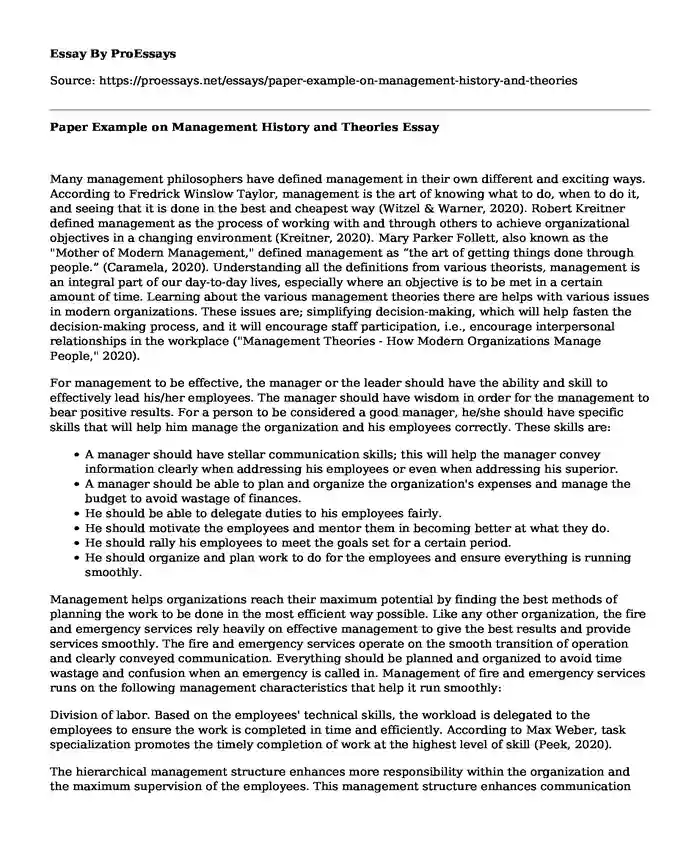Many management philosophers have defined management in their own different and exciting ways. According to Fredrick Winslow Taylor, management is the art of knowing what to do, when to do it, and seeing that it is done in the best and cheapest way (Witzel & Warner, 2020). Robert Kreitner defined management as the process of working with and through others to achieve organizational objectives in a changing environment (Kreitner, 2020). Mary Parker Follett, also known as the "Mother of Modern Management," defined management as “the art of getting things done through people.” (Caramela, 2020). Understanding all the definitions from various theorists, management is an integral part of our day-to-day lives, especially where an objective is to be met in a certain amount of time. Learning about the various management theories there are helps with various issues in modern organizations. These issues are; simplifying decision-making, which will help fasten the decision-making process, and it will encourage staff participation, i.e., encourage interpersonal relationships in the workplace ("Management Theories - How Modern Organizations Manage People," 2020).
For management to be effective, the manager or the leader should have the ability and skill to effectively lead his/her employees. The manager should have wisdom in order for the management to bear positive results. For a person to be considered a good manager, he/she should have specific skills that will help him manage the organization and his employees correctly. These skills are:
- A manager should have stellar communication skills; this will help the manager convey information clearly when addressing his employees or even when addressing his superior.
- A manager should be able to plan and organize the organization's expenses and manage the budget to avoid wastage of finances.
- He should be able to delegate duties to his employees fairly.
- He should motivate the employees and mentor them in becoming better at what they do.
- He should rally his employees to meet the goals set for a certain period.
- He should organize and plan work to do for the employees and ensure everything is running smoothly.
Management helps organizations reach their maximum potential by finding the best methods of planning the work to be done in the most efficient way possible. Like any other organization, the fire and emergency services rely heavily on effective management to give the best results and provide services smoothly. The fire and emergency services operate on the smooth transition of operation and clearly conveyed communication. Everything should be planned and organized to avoid time wastage and confusion when an emergency is called in. Management of fire and emergency services runs on the following management characteristics that help it run smoothly:
Division of labor. Based on the employees' technical skills, the workload is delegated to the employees to ensure the work is completed in time and efficiently. According to Max Weber, task specialization promotes the timely completion of work at the highest level of skill (Peek, 2020).
The hierarchical management structure enhances more responsibility within the organization and the maximum supervision of the employees. This management structure enhances communication and the delegation of duties as it clearly stipulates the authority.
Management runs smoothly with trust and respect in the organization. In fire and emergency services, management is critical to provide a conducive environment for everyone to be productive and provide services efficiently.
References
Witzel, M., & Warner, M. (2020). The Oxford Handbook of Management Theorists. Google Books. Retrieved 12 September 2020, from https://books.google.co.ke/books?hl=en&lr=&id=xYsr3qAGLGUC&oi=fnd&pg=PP1&dq=management+theorists+and+their+contribution&ots=pZMPYcJKkF&sig=DaEMc3jOE1HQm6oHbU6x6STk_l4&redir_esc=y#v=onepage&q=management%20theorists%20and%20their%20contribution&f=false.
Kreitner, R. (2020). Management (11th ed.). Houghton Mifflin Harcourt Publishing Company. Management Theories - How Modern Organizations Manage People. Corporate Finance Institute. (2020). Retrieved 13 September 2020, from https://corporatefinanceinstitute.com/resources/careers/soft-skills/management-theories/.
Peek, S. (2020). Business.com. Retrieved 13 September 2020, from https://www.business.com/articles/management-theory-of-max-weber/.
Cite this page
Paper Example on Management History and Theories. (2023, Dec 13). Retrieved from https://proessays.net/essays/paper-example-on-management-history-and-theories
If you are the original author of this essay and no longer wish to have it published on the ProEssays website, please click below to request its removal:
- Assignment Example on Leadership Traits, Behaviors and Styles
- Functionalism, Behaviorism and Identity Theory Essay
- Reading a Passage and Answering Questions on Adaptive Leadership
- Essay Example on Entrepreneurial: Thinking Creatively to Achieve the Impossible
- Paper Example on Coca-Cola's Breakthrough Innovation: Innovating the Packaging Process
- Paper Example on Technology, Digitization, and Productivity: A Guide
- Essay Example on The Human Stain: Identity, Change, and Freedom







